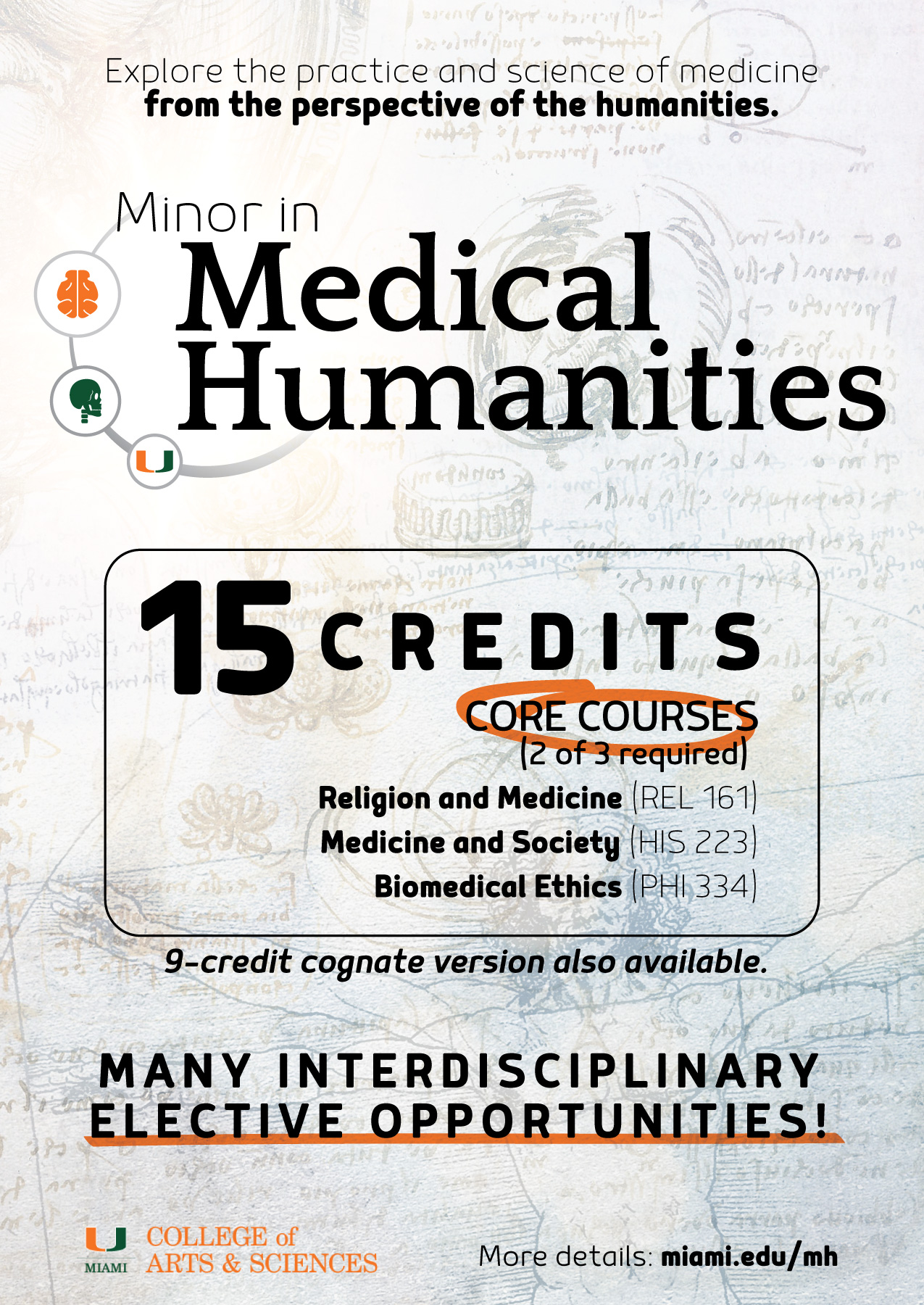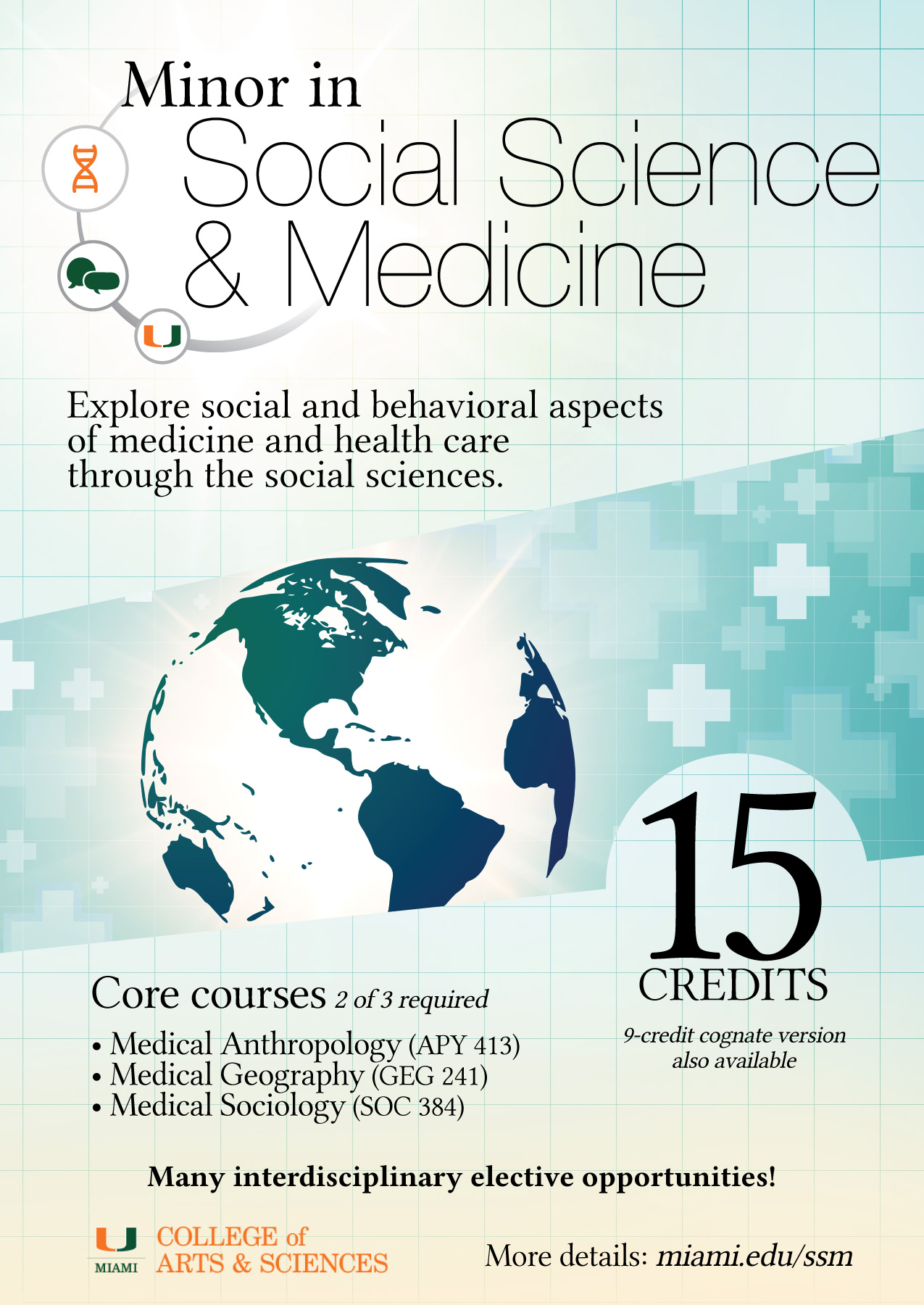Credits: 15 Credit Hours
Introduction
 The minor in Medical Humanities offers students the chance to explore the practice and science of medicine from the perspective of the humanities, and to engage with the history and cultural significance of medicine and health from ancient times to today. Students will learn that medicine and health are variously considered a science, an art, and a calling, and be able to situate themselves in a profession that spans from antiquity to the modern era of biotechnology.
The minor in Medical Humanities offers students the chance to explore the practice and science of medicine from the perspective of the humanities, and to engage with the history and cultural significance of medicine and health from ancient times to today. Students will learn that medicine and health are variously considered a science, an art, and a calling, and be able to situate themselves in a profession that spans from antiquity to the modern era of biotechnology.
The minor has a liberal arts orientation and provides an interdisciplinary humanities curriculum that incorporates literature, philosophy, ethics, history, religion, women and gender studies, theater, film, and visual arts. The minor complements majors from all humanities, social science, and physical science disciplines and is particularly suited to students interested in careers in public health, medicine, the health sciences, health care management, and (non-)governmental organizations.
Educational Objectives
• Understand the history, philosophy, practice, and religious roots of the medical sciences.
• Explore issues of debate within medicine from an ethical and humanistic perspective.
• Articulate how and where the humanities enrich and lend perspective to the medical field.
• Recognize and understand the complexity and necessity of engaging with narratives in the medical field.
• View the practice of medicine as the integration of science and humanities.
Requirements
Students will complete 15 credit hours with courses approved for the minor in Medical Humanities, which satisfies the general education cognate requirement for Arts and Humanities. Students must earn a grade of C- or better in each course and maintain a cumulative GPA of at least 2.0 in all courses counting toward the minor.
• Students must complete 2 of the 4 core courses listed below.
• At least 6 credit hours must be taken at the 300 level or higher
• No more than 6 credit hours may be applied to the minor from a single department.
• One elective is permitted from those courses eligible for the minor in Social Science & Medicine.
Advising
For more information, please visit the Academic Bulletin or email the program advisor for the Medical Humanities, Dr. Catherine Newell, particularly if you have inquiries about credit for courses not listed below, such as Special Topics offerings, etc. Click here to see eligible courses offered in the upcoming semester.
Required Courses (select 2 of 4)
REL 161 Religion and Medicine
Explores the role of personal religious beliefs and faith in health care, healing, and the biomedical sciences.
CLA 233 Ancient Medicine
A historical survey of evidence, practices, and ideas from the ancient medical world, with focus on the intersection of medicine and philosophy, medicine and religion, and medicine and rhetoric.
HIS 223 Medicine and Society: From the Ancient World to the 21st Century
A historical survey of the development of western medicine and public health from prehistory to the present.
PHI 334 Biomedical Ethics
Ethical dimensions of clinical practice and larger social justice concerns as they relate to health care.
Elective Courses
CLA 222 Sexuality and Gender in the Ancient World
Basic questions of sexuality and gender in ancient Greece and Rome.
CLA 225 Ancient Magic
A broad sweep of evidence for magic and the occult in the ancient Mediterranean world with focus on occult arts such as divination, daemonology, astrology, and alchemy.
CLA 231 Sciences in Ancient Greece and Rome
The beginnings of scientific investigation in ancient Greece and its development and codification under the Roman Empire.
ENG 240 Literature and Medicine
Examines ultimate questions in medicine asked by patients, doctors, and disease through literature: fiction, drama, poetry, and non-fiction. Also explores the literary uses to which medicine can be put
HIS 330 Scientific Revolution
Investigates the changing ways in which Europeans understood the natural world in the transformative period from 1500 to 1800.
HIS 351 Science and Society
Addresses major questions about the relationship between science and society from prehistory to the present.
PHI 546 Evidence and Knowledge in Medicine
Basic methodologies in medicine in the context of philosophical theories of evidence.
REL 252 Religion and Human Sexuality
The relationship between religious concepts and sexual values as the Judeo-Christian tradition confronts contemporary sexual ethics and behavior.
REL 351 Religious Issues in Death and Dying
Consideration of the teachings of major religious traditions about death and the nature of the dying process, with attention to the students’ personal experiences with and attitudes toward death.
REL 352 Religion and Science
Examines the religious and ethical issues created by modern science and technology.
REL 360 Religion and Bioethics
An interdisciplinary approach to biomedical ethics that integrates our understanding of medical issues with philosophical and religious reflection and public policy considerations.
REL 451 Ethics and Genetics
Examines the relationship and interaction between scientific/technological progress and religious/ethical values.
THA 108 Intro to Standardized Patient Simulation
Support interactive clinical training through standardized patient simulation, i.e. healthy people trained to realistically portray a specific patient's history, subtext, personality, physical infirmities, and emotional states.
WGS 315 Gender, Race, and Class
How scientific practice, political systems, and popular media shape our thinking about gender, race, and class.
WGS 347 Issues in Reproductive Medicine
Social, economic, political, legal, religious, philosophical, and psychological aspects of the global reproductive medicine industry and related genetic technologies.
WGS 420 Interpreting Bodies
Uses anthropological and feminist perspectives to explore how bodies communicate many intriguing and significant ideas about societies and the individuals that comprise them.







